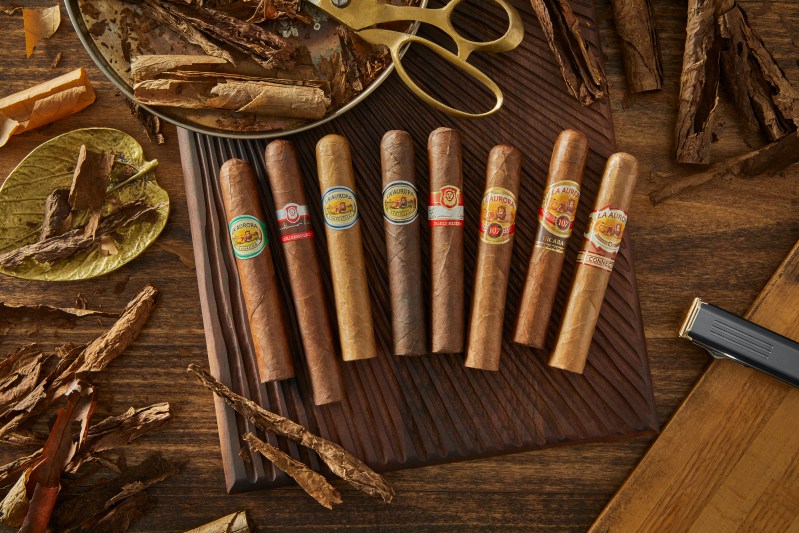
Since most goods have an expiration date or “best used by” date, it makes sense that cigars would have one, too, right? Well, yes and no. The real answer is a bit tricky because cigars don’t expire like foods and perishables do. In fact, some premium cigars even improve in flavor with age — meaning the longer you store or age them, the better they get. That’s not true with all cigars, as some you don’t want to age at all, but the gist is that there’s no official expiration. That said, cigars must be stored properly in a humidor while keeping the humidity and temperature levels optimal. Otherwise, the cigar will dry out quickly, losing its nuanced flavor. Let’s discuss it in more detail, shall we?
How long does a cigar last?

Most cigars will last indefinitely if stored properly in a humidor with ideal temperature and humidity levels. Premium cigars tend to improve with age, which is why cigar enthusiasts often talk about aging their cigars. That means they merely store the cigars for an extended time and do not smoke them to let the tobacco and blend rest.
Some cigars that age great are:
However, depending on the particular blend, some cigars do not age well. They’re best smoked as soon as you get them or soon after. There are a few reasons for this, including the quality of the cigar itself, the tobacco and ingredients used to roll the cigar, and the pre-aging of the tobacco. Before putting them on the market, many cigar brands already age the cigars, sometimes for years at a time.
The most essential element of cigar aging is the flavor or, rather, the experience you’ll have because of it. Like fine wines, a cigar’s complex flavors can intensify as it ages. But again, it depends almost entirely on the blend and quality of the cigar. If you try to age a cigar that should not be and then smoke it after a long rest, much of the flavor will be gone — it will be more like smoking flavorless paper, which is not enjoyable.
If you don’t store cigars appropriately, they will dry out and not taste as good. Here’s a primer on what cigars taste like for comparison.
How do you know if a cigar is dried out or expired?

A telltale sign of a dried-out cigar is a cracked or damaged wrapper. You may also notice crumbling, or when you feel the cigar, it’s not suitably spongy, meaning it’s extra hard and doesn’t respond when you squish it ever so slightly. A humid cigar will feel balanced and have a somewhat spongy response, yet it’s still durable. Thanks to the moisture inside, it won’t crack, break, or compress too much when you squish it.
The opposite can also happen. A cigar can be too humid. The same signs may appear like a cracking or broken wrapper, primarily because of too much expansion from the extra moisture, but you may also see mold. Mold is not good. If you find a cigar with mold in your humidor, you’ll want to clean it out and check your other cigars immediately. That’s one reason we recommend keeping the cellophane on your cigars even when stored inside your humidor. They’re relatively protected and isolated from others if ever there’s a mold or beetle problem.
Both situations — dry or too wet — will result in a poor smoking experience. Cigars that are too dry or humid will burn hot, maybe even burning your lips, mouth, or throat. They will burn unevenly or tunnel and may even fall apart as you smoke. The wrapper can come loose and unravel, or the heat buildup inside the cigar can cause further issues.
You must store cigars in the correct conditions to ensure a pleasurable smoking experience. Curious what that’s like? We have a guide that explains precisely how cigars make you feel.
How long does a cigar last while out of the wrapper or outside a humidor?

It depends on the type of cigar and how it’s been stored. The ideal humidity range is between 62 and 70 Relative Humidity (RH). I like to keep mine right in the middle, around 65 RH, as do most cigar enthusiasts. The higher the humidity, the longer the cigar will retain moisture, with one exception: the climate where you live. You want to keep the humidity levels lower in a humid place like Florida, where I live. That’s because as soon as you take the cigar out of the humidor and step outside, it begins soaking up more humidity. In a dry place like Arizona, you want more humidity. As soon as you step outside with that cigar, it will begin drying out faster than anywhere else.
The amount of time you can keep that cigar out of the humidor and out of its cellophane differs depending on the climate and humidity. More humidity means it will be fine for longer unless it’s in a dry environment. There are further exceptions to this, of course, and your real-world experience will always change, but as a general rule, that’s what we’re working with.
As soon as you take your cigar out of the humidor and out of the cellophane, preparing to smoke it, you should do so within the next 24 hours. I would argue that you should smoke it within the next few hours when the flavor will be strongest.
Some cigar enthusiasts like to “dry box” their cigars before smoking them. They’ll take them out of their humidor up to a day before and let them dry out a little to bring the humidity down. Even so, they still smoke them relatively soon, so they’re not dry boxing for long.
Some things to keep in mind:
- Don’t freeze or refrigerate your cigars.
- Always store your cigars in a humidor, whether a large cabinet-style one or a smaller tabletop or desk humidor. Some even use , plastic Tupperware-style humidors that seal up tight.
- Maintain humidity in your humidor. You can use a or similarly automated system, filling it regularly with distilled water. If your humidor is smaller, Boveda packs also work great.
- Check them regularly for signs of damage, mold, or even cigar beetles.
- Monitor the temperature, not just the humidity. Ideally, your cigars should be stored between 65 and 70 degrees Fahrenheit. If possible, try to avoid sudden or broad temperature changes.
- Rotate your cigars by occasionally swapping them around inside your humidor, especially if you have a large cabinet humidor. This helps ensure they absorb moisture evenly.
In summary, with proper storage in a humidor and optimal temperature and humidity levels, you can pretty much keep a cigar indefinitely. Although some are better when smoked soon after you buy them, most premium cigars improve with age. If you take a cigar out of the humidor and out of its cellophane, you should plan to smoke it within the next 24 to 48 hours.



